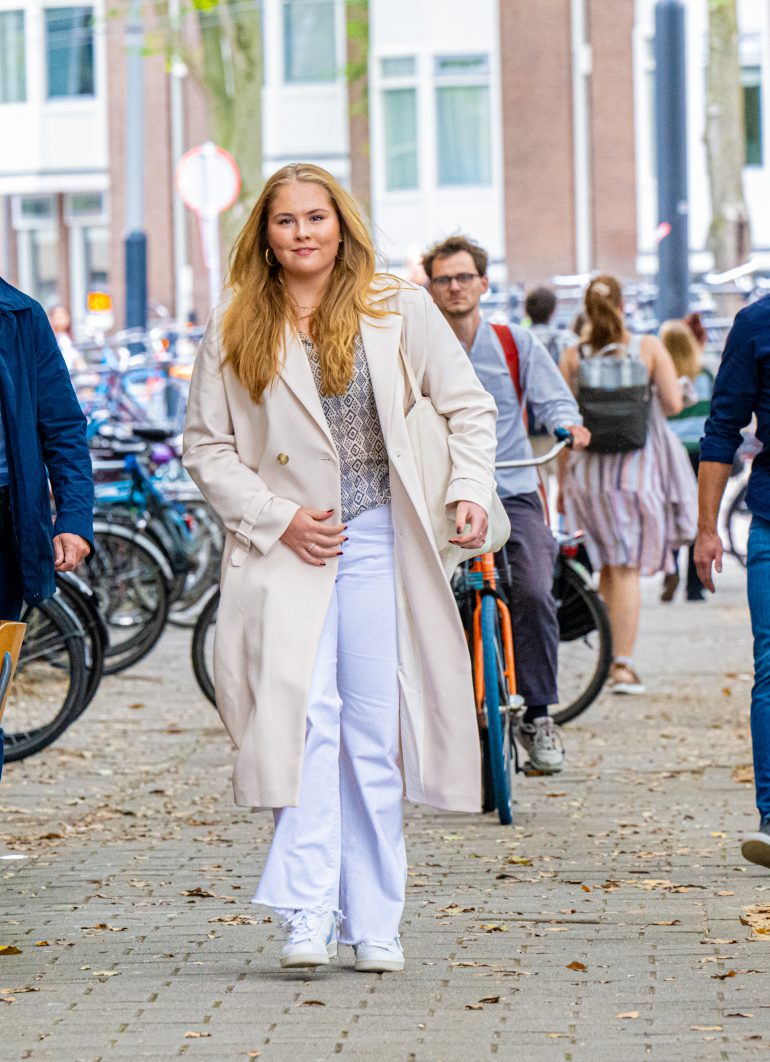Princess Amalia, the 18-year-old heir to the throne of the Netherlands, recently started studying at the University of Amsterdam. Her course, PPLE, is a small-scale, interdisciplinary Bachelor’s programme that connects four disciplines: Politics, Psychology, Law and Economics. In September, she moved into a shared student house on a picturesque Amsterdam canal. However, she has not been able to enjoy student life for long: recently it emerged that the security services have moved her back from her student house in Amsterdam to the Huis ten Bosch royal palace in Den Haag, due to security threats. Amalia is said to be forcibly housebound and unable to leave her current residence.
After De Telegraaf broke the story last month that security measures surrounding both Amalia and Prime Minister Mark Rutte had been increased, a spokesperson for the Government Information Service (RVD) at the time declined to comment on the Princess’s living arrangements, as did the police and Public Prosecution Service. This is not unusual, as the Royal House and the RVD are – perhaps naturally – hesitant about commenting on security issues surrounding the royal family.
So it was striking that King Willem-Alexander and Queen Máxima on a recent state visit to Sweden made some unexpected public comments in relation to Amalia’s situation. They gave a relatively detailed description of Amalia’s current situation. In response to a question about how the parents were finding life without their oldest daughter, Queen Máxima replied: ‘She hasn’t really left. You may have heard the news [referring to the previous reports] and that has enormous consequences for her life.’ Maxima went on to confirm that Amalia ‘doesn’t live in Amsterdam and can’t really go outside’. The Queen went on to discuss the impositions this was placing on Amalia’s life: ‘She doesn’t have a student life like other students have. I’m really proud of her [and] how she keeps her spirits up despite all that.’ The King added that the situation in which Amalia finds herself is ‘very difficult.’
Prime Minister Mark Rutte commented on the current circumstances during his weekly press conference, stating that: ‘It definitely affects her and the way she can shape her studies.’ Apparently, Amalia still visits university, but travels by car and is escorted to the lecture theatre, leaving straight after her classes. Rutte also made clear that ‘everything is being done’ to resolve the situation. He added that ‘everyone is working on it with all their might’, and ‘it has the highest priority [of the government] permanently’. Rutte was noticeably tight-lipped in regards to certain aspects of the case, refusing to explain which government agencies are handling Amalia’s security issues or which person or groups were causing the threats. ‘I’m not going to make the opponent wiser than he already is,’ Rutte said.
While Rutte may have refused to suggest who might be behind the threats to Amalia’s safety, it has been widely reported across Dutch media that the situation has direct links to organised crime gangs. Rick Evers, Dutch royal correspondent and author of Máxima, more than Majesty, was one of many to link the events to the ‘Mocro-mafia’, the name given to gangs with Moroccan roots involved in large-scale drug trafficking, particularly cocaine, that has gripped the Netherlands in recent years. Jelle van Buuren, Assistant Professor and security expert at Leiden University, also said that ‘it is rumoured the security threat comes from organised crime’.
The government refused to confirm a timeframe as to when Amalia might return to a sense of normalcy and move back to Amsterdam to continue her studies publicly at the UvA. Rutte stated that ‘he cannot make any guarantees’ on when the threat level will be reduced sufficiently for Amalia to safely move back to Amsterdam. The Princess is scheduled to take her first Royal Tour of the Dutch Caribbean Islands in January 2023 with her parents. Whether Amalia will participate in this tour in light of these events is yet to be determined.
Amalia made world headlines in 2021 when she became the first Dutch royal to reject her yearly allowance, which is assigned to her in the government’s budget. In a handwritten letter to the Prime Minister, she wrote she found the idea of accepting the money ‘uncomfortable while I do not do any work to deserve it’.
Written by James Turrell
